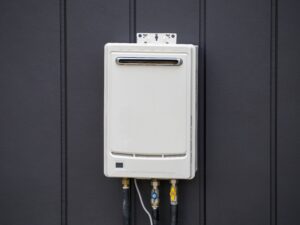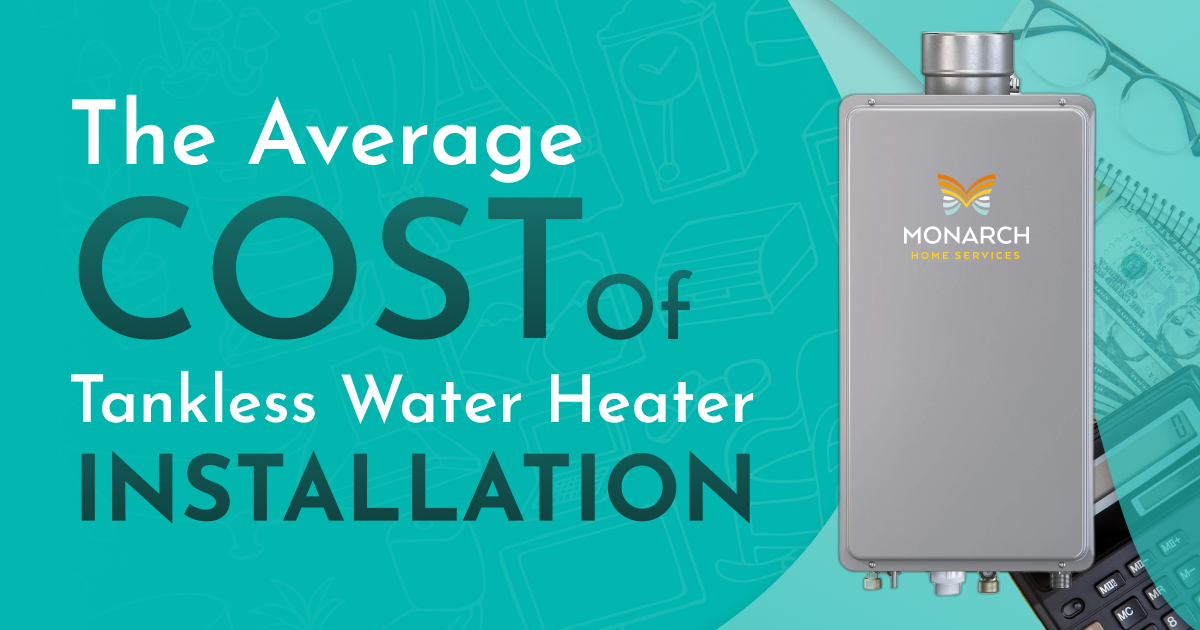Installing a tankless water heater offers several benefits, including improved energy efficiency, on-demand hot water, and long-term savings. Tankless water heater installation costs vary widely depending on your home’s hot water demand, the type of unit, and other factors. Let Monarch Home Services assess your hot water needs and provide an expertly calculated estimate.

Average Cost to Install a Tankless Water Heater
Most homeowners can expect to pay between $2,500 and $6,000 for a tankless water heater. This range includes the price of the equipment and professional installation labor, but actual costs depend on your home’s current plumbing and electrical setup, the type of heater selected, and any required upgrades.
With so many cost variables, consulting a licensed plumber is the most reliable way to determine an accurate cost. Professionals evaluate your home, water usage habits, utility connections, and other needs and preferences.
Gas vs. Electric Tankless Water Heater Costs
Choosing between a gas and electric tankless water heater involves considering several factors to determine which option delivers the most value.
- Unit cost: Electric tankless units usually cost less upfront than gas models due to simpler internal components.
- Energy efficiency: Electric models are over 98% efficient, while gas units average around 80% to 85%.
- Fuel costs: Electric units offer higher efficiency at lower flow rates but may cost more to run depending on local utility rates. Gas systems often deliver better efficiency and lower operating costs for high-demand households.
- Installation complexity: Gas systems often need venting and gas line work, which adds time and labor, while electric unit installations are simpler and less labor-intensive.
- Utility availability: Gas systems depend on an accessible fuel supply and may need gas line upgrades.
- Maintenance: Electric systems tend to last longer due to fewer mechanical parts, while gas units may have more complex and costly maintenance needs.
Factors That Affect Tankless Water Heater Installation Cost
The installation cost of a tankless water heater depends on different variables, and understanding them helps you plan for your installation and make cost-effective decisions.
Unit Type and Brand
Tankless systems vary in engineering and installation needs. Non-condensing units cost less upfront and work well for homes with simple venting options. Condensing units recover more heat through a secondary exchanger and offer higher energy efficiency, but they add complexity, especially in tighter spaces.
Different brands have variations in features, efficiency, and warranty coverage that influence pricing. High-end brands may have higher unit prices, but they typically offer superior materials and more comprehensive warranty coverage that provides long-term value. High-capacity units cost more but are necessary for larger households that expect multiple fixtures to run at once.
Location and Labor Rates
Densely populated or high-demand areas usually have higher labor rates for licensed trades. Labor rates may be similarly lower in regions with lower demand or cost of living.
The installation location in your home also impacts labor time and complexity. Homes without clear access routes for venting or drainage may require additional plumbing or structural modifications.
Plumbing or Electrical Upgrades
Some installations require updates to your home’s plumbing or electrical systems. Tankless systems often need water filters added to prevent clogging in areas with hard water. For electric models, upgrades may involve upgrading the panel, adding dedicated circuits, or installing subpanels, while gas systems may need new gas lines. Replacement of water supply lines in poor condition also increases labor and material costs.
Permits and Code Compliance
Local building codes often require permits and inspections for water heater replacements, and fees vary depending on the area and specific installation. This is especially true for gas installations, which must meet ventilation and combustion safety standards.
Removal of Old System
Removing an old tank water heater involves disconnecting plumbing and electrical or gas lines, draining the unit, and disposing of the tank safely, which adds to plumber costs for heating tankless water heaterreplacement. If the old system leaked and damaged the floors and walls, some spaces may also need remediation.
Tankless Water Heater Long-Term Savings and Efficiency
While the upfront cost of installing a tankless water heater may seem high, these systems deliver long-term value. Cost-saving advantages include:
- Reduced energy waste: Tankless systems heat water on demand, eliminating standby energy loss and lowering utility bills.
- Increased equipment lifespan: Tankless units often last more than 20 years with proper care, and fewer replacements improve long-term operating costs.
- Energy incentives: Since tankless water heaters are energy-efficient, many models qualify for rebates or tax credits that offset upfront costs.
Are Tankless Water Heaters Worth the Investment?
When comparing tankless vs. traditional water heater cost, homeowners should consider these differences when evaluating which system is a better investment:
- Installation cost: Traditional tank systems cost less to install compared to tankless units. With a longer lifespan and energy savings, tankless water heaters generally provide net cost savings.
- Energy efficiency and operating costs: Tank water heaters maintain a hot water supply, which wastes energy during standby periods. Tankless units heat water on demand, lowering operating costs by up to 34%, depending on usage patterns and unit efficiency.
- Space: Tankless systems can be mounted on walls and installed in cabinets, closets, and other small spaces, but tank systems require more floor space and clearance.
- Hot water demand: Tankless systems have flow rate limits, and larger homes may need multiple tankless units or a high-capacity model to meet simultaneous demand. Tank systems deliver high-volume water instantly but must be reheated between uses.
- Longevity: Tank systems typically last 10 to 12 years, but tankless heaters can last 20 years or more with proper maintenance.
Tankless models are well-suited to households with moderate or staggered demand, such as families that may need hot water from multiple fixtures at once but have longer periods of disuse during the day. If you’re replacing a system in a smaller home or condo, a tankless unit’s compact footprint makes it easier to install without sacrificing storage or floor space.
A tank water heater may be a better fit for limited installation budgets, large homes with space for a tank unit, and high hot water demand. Since tank models offer high initial hot water volume, larger households or homes with simultaneous hot water habits may benefit more from a tank system than a whole-home tankless system with added infrastructure.

Get Expert Installation from Monarch Home Experts
At Monarch Home Services, our licensed plumbers help homeowners throughout Central California choose the right system and keep it running at peak performance. We’re committed to helping you enjoy the benefits of modern water heating technology with long-term savings and dependable performance. Contact us at Monarch Home Services today to schedule a consultation and receive a personalized estimate for tankless water heater installation.


